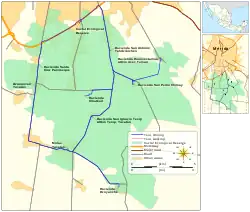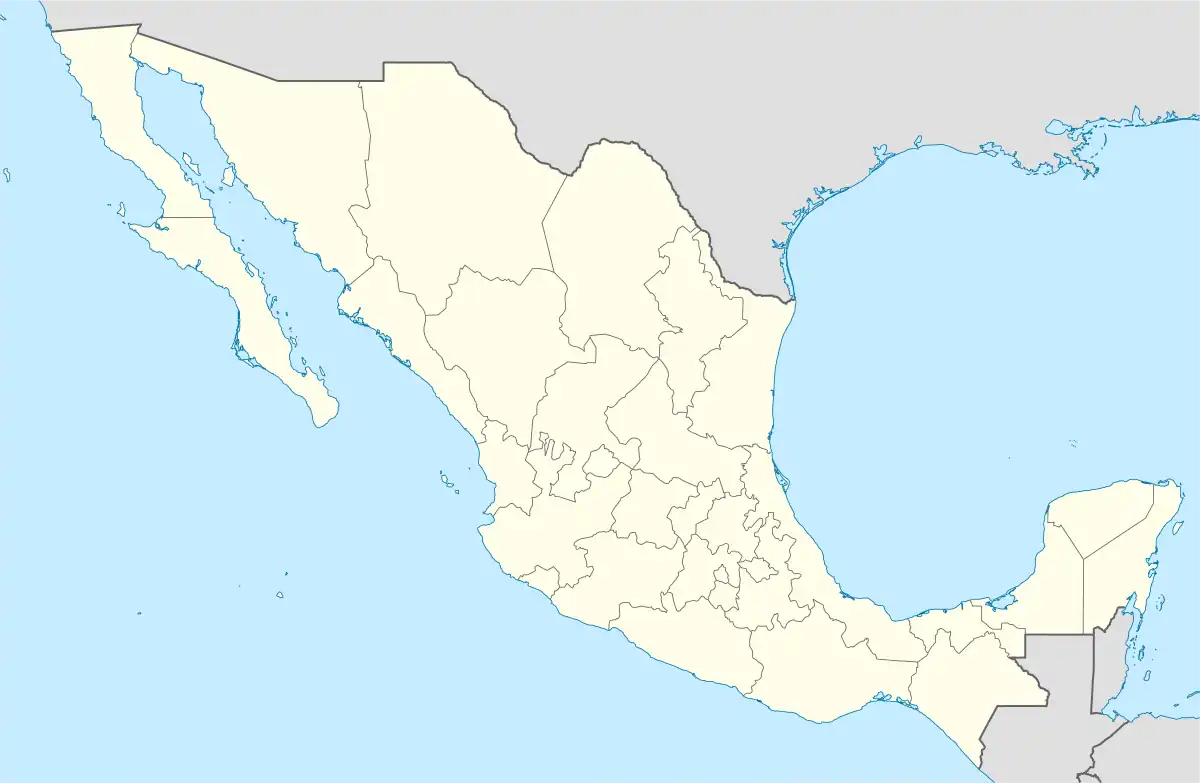Hacienda Hunxectamán
Hacienda Hunxectamán is located in the Mérida Municipality in the state of Yucatán in southeastern Mexico. It is one of the properties that arose during the nineteenth century henequen boom. It is part of the Cuxtal Ecological Reserve which was set aside in 1993 to protect both the man-made and natural history of the reserve area of Mérida.
Hacienda Hunxectamán | |
|---|---|
Private Event Venue | |
%252C_Yucat%C3%A1n_(02).jpg.webp) Entrance Hacienda Hunxectamán, Yucatán. | |
 | |
 Hacienda Hunxectamán Location in Mexico | |
| Coordinates: 20°52′57″N 89°33′31″W | |
| Country | Mexico |
| Mexican States | Yucatán |
| Municipalities | Mérida Municipality |
| Time zone | UTC−6 (CST) |
| • Summer (DST) | UTC−5 (CDT) |
| Postal code | 97316[1] |
| Area code | 999[2] |
Toponymy
The name (Hunxectamán) is a word derived from the Yucatec Mayan language, which can be spelled as Hunxactaman, Hunxectamán, or Uxec Taman.[3] It comes from the words "hun" meaning one, "xec" meaning group and "taman" meaning sheep (ram/lamb).[4]
How to get there
The property is located 11 km south of Mérida on Calle 77.
History
On 28 June 1993 the Cuxtal Ecological Reserve was designated to protect the history of the 7 large haciendas, their adjoining pueblas, 12 minor archaeological sites, 6 cenotes and one of Merida's important water supply stations.[5] Hacienda Hunxectamán was part of this historic designation.[6]
Within the reserve are the following protected haciendas:[6]
- Hacienda Hunxectamán in the village of Uxec Taman
- Hacienda San Antonio Tahdzibichén
- Hacienda San Ignacio Tesip in the village of Tesip
- Hacienda San Nicolás Dzoyaxché, contains Cenote Dzonot-Ich on its grounds[7]
- Hacienda San Pedro Chimay
- Hacienda Santa Cruz Palomeque
- Hacienda Xmatkuil
Demographics
All of the henequen plantations ceased to exist as autonomous communities with the agrarian land reform implemented by President Lazaro Cardenas in 1937. His decree turned the haciendas into collective ejidos, leaving only 150 hectares to the former landowners for use as private property.[8] Figures before 1937 indicate populations living on the farm. After 1937, figures indicate those living in the community, as the remaining Hacienda Hunxectamán houses only the owner's immediate family.
According to the 2005 census conducted by the INEGI, the population of the city was 104 inhabitants, of whom 55 were men and 49 were women.[9]
| Year | 1900 | 1910 | 1921 | 1930 | 1940 | 1950 | 1960 | 1970 | 1980 | 1990 | 1995 | 2000 | 2005 |
|---|---|---|---|---|---|---|---|---|---|---|---|---|---|
| Population | 114 | 94 | 120 | 95 | 61 | 39 | 0 | 0 | 0 | 80 | 119 | 143 | 143 |
References
- "Consulta Códigos Postales". Servicio Postal Mexicano. Correos de México. Retrieved 29 April 2015.
- "Yucatan Mexico Telephone Area Codes". Travel Yucatan. Travel Yucatan. Retrieved 29 April 2015.
- "Hunxectamán". Geoview Info. Geoview Info. Retrieved 9 May 2015.
- "T". Mayas uady. (in Yucatec Maya). Mérida, Mexico: Universidad Autónoma de Yucatán. Retrieved 9 May 2015.
- Lougheed, Vivien (2009). Yucatan Chetumal, Merida, Campeche. Edison, N.J.: Hunter Publishing. p. 22. ISBN 978-1-588-43734-1. Retrieved 8 May 2015.
- "Reserva Ecologica Municipal Cuxtal" (PDF). The Matrix. Mérida, Mexico: Municipal Government of Merida, Yucatán. Archived from the original (PDF) on 24 September 2015. Retrieved 9 May 2015.
- "Haciendas » Dzoyaxché". Gobierno del Estado de Yucatán (in Spanish). Mérida, Mexico: Gobierno del Estado de Yucatán. Retrieved 9 May 2015.
- Joseph, Gilbert Michael (1988). Revolution from without : Yucatán, Mexico, and the United States, 1880-1924 (Pbk. ed.). Durham: Duke University Press. p. 292. ISBN 0-8223-0822-3. Retrieved 29 April 2015.
- "Hunxectamán". PueblosAmerica (in Spanish). PueblosAmerica. Retrieved 9 May 2015.
Bibliography
- Bracamonte, P and Solís, R., Los espacios de autonomía maya, Ed. UADY, Mérida, 1997.
- Gobierno del Estado de Yucatán, "Los municipios de Yucatán", 1988.
- Kurjack, Edward y Silvia Garza, Atlas arqueológico del Estado de Yucatán, Ed. INAH, 1980.
- Patch, Robert, La formación de las estancias y haciendas en Yucatán durante la colonia, Ed. UADY, 1976.
- Peón Ancona, J. F., "Las antiguas haciendas de Yucatán", en Diario de Yucatán, Mérida, 1971.
External links
Photo gallery
%252C_Yucat%C3%A1n_(01).jpg.webp) Company Store of Hacienda Hunxectamán
Company Store of Hacienda Hunxectamán%252C_Yucat%C3%A1n_(03).jpg.webp) View of Hacienda Hunxectamán
View of Hacienda Hunxectamán%252C_Yucat%C3%A1n_(04).jpg.webp) View of Hacienda Hunxectamán
View of Hacienda Hunxectamán%252C_Yucat%C3%A1n_(05).jpg.webp) View of Hacienda Hunxectamán
View of Hacienda Hunxectamán%252C_Yucat%C3%A1n_(06).jpg.webp) Church at Hacienda Hunxectamán
Church at Hacienda Hunxectamán%252C_Yucat%C3%A1n_(07).jpg.webp) View of Hacienda Hunxectamán
View of Hacienda Hunxectamán